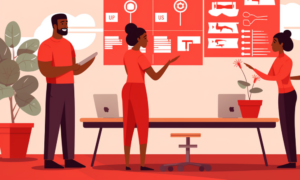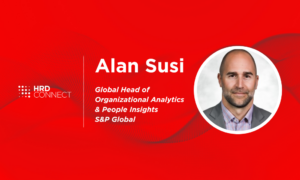Q&A with IBM's Gary Kildare: Neuroscience, employee co-creation and organisational change
- 6 Min Read
How important is it for businesses to re-imagine their workforce strategies? How can design thinking and employee co-creation play a role? Most large organisations will have a totally different workforce strategy to the one they had a couple of decades ago, and perhaps even just a few years ago. History tells us that workforce strategies […]
- Author: Rachel Montgomery-Young
- Date published: Mar 27, 2017
- Categories

How important is it for businesses to re-imagine their workforce strategies? How can design thinking and employee co-creation play a role?
Most large organisations will have a totally different workforce strategy to the one they had a couple of decades ago, and perhaps even just a few years ago. History tells us that workforce strategies have to change, and the pace of change is accelerating so we can’t be complacent and assume our strategy from last year doesn’t need updating today.
Clients are looking beyond cost. They want value. And a new generation of employees have different expectations from those who went before them. It’s not just about the salary. It’s about the whole package. The culture, the engagement, the sense of accomplishment, the networking, the flexibility. If we’re not reimagining our workforce strategy for this generation (and the next!) then we leave an open goal for the competition.
Let me give you two examples of design thinking and co-creation at IBM: Last year, Cognitive Build was set up as a global, multi-phase, collaborative initiative in which tens of thousands of IBM employees came together in small groups to brainstorm ideas and to develop working prototypes for new products, services and internal processes based on the company’s cognitive computing system, Watson. Having enjoyed previous success with large-scale online collaboration efforts called “jams,” IBM adapted these in Cognitive Build to include the characteristics of a hackathon – going beyond brainstorming to actual product and service creation.
The other example is our performance review system: The HR department decided to match it more to the way the company’s employees now work. To revamp it, the HR department didn’t just pick a new system and implement it; it turned to its 380,000 employees in 170 countries to crowdsource the process. Then, in a blog post on IBM’s internal social media platform employees were asked to share their ideas for a new performance management system. We went on to run local roundtables and launch a co-creation area, which attracted 90,000 visits and 24,000 responses.
In the end, the employee suggestions convinced IBM to tweak its review system in new ways it hadn’t necessarily expected. The end result was a new app-based performance review system called Checkpoint, where official feedback is given on at least a quarterly basis — and it’s supplemented by a more casual, ongoing dialogue between employees based on appreciation, coaching and evaluation.
How important is culture in leading business transformation? What is culture’s role in enabling organisational change? And what can HR Leaders do to ensure culture is leveraged in the change process?
Culture is always at the core of a transformational process. To get the workforce empowered you always have to address culture. We all know that to be able to succeed, people need to feel appreciated and learn at the same time. Take “Checkpoint” again, our new performance review system, which is part of creating a ‘culture of feedback’. These days, candidates and employees expect a highly personal social, digital and mobile experience from employers that rivals their everyday consumer experiences. Nowadays employees live in a society that is more and more accustomed to instantly “liking” posts on social media platforms.
It is a culture shift and companies including HR responsibilities have to find ways to meet these expectations by spear-heading game-changing initiatives that are making measurable impact. These should focus on creating an agile culture, adapting to employees needs for legendary experiences and enabling the workforce and leaders to place people and growth first so all succeed.
Another important angle here is diversity. The best catalyst for innovation is weaving together the richness of a truly global and inclusive workforce. Different backgrounds, cultural perspectives, fresh ideas from our youngest colleagues and the expertise of those who have been with IBM for quite some time… All this, together with a continuous appetite to keep discovering and learning in a life-long journey are key ingredients to a successful culture.
No discussion about culture would be complete without a sporting analogy. Eddie Jones is building an outstanding reputation as one of the best rugby coaches in the world and when asked about his most valuable experience, he doesn’t provide insight into the heavy training sessions, the injuries, the players – instead he speaks about the lessons of raising his daughter. He says that imposing his will, being tough, fighting through things, respecting authority – didn’t work. His most important lessons were about being more sympathetic, trying to understand better – engaging so that people can make decisions for themselves, because you can’t make decisions for them.
This has influenced the way Jones has been coaching and even where there have been examples of poor behaviour and calls for tough action and discipline, he has resisted. Jones argues that if you trust players and set clear expectations, they will step up. The team players are self-policing he argues – we have nothing written down. Jones acknowledges that mistakes happen along the way, but that is where the learning comes from. If you have a lot rules – you spend most of your time policing the rules and not enough time on relationships – which (he says) are EVERYTHING. He ends by saying – “I am not teaching them how to play rugby – I am teaching them how to be a team.”
Neuroscience is leading us to a greater understanding of how to improve leadership behaviours and performance. How has IBM approached cognitive science to develop leaders? How has neuroscience helped organisational transformation succeed?
We are delving more and more into neuroscience to better understand how people think and the dynamics of, for example feedback and coaching in fostering a growth mindset. People need to hear appreciation, feel they are in a safe environment and have the empowerment to bring forward new ideas. It is very interesting research, and we are actively taking it to our leaders in short learning modules to broaden understanding of why these behaviors are so important for our culture.
Cognitive science refers to systems that learn at scale, reason with purpose and interact with humans naturally. Rather than being explicitly programmed, they learn and reason from their interactions with us and from their experiences with their environment. Cognitive computing can create deeper human engagement because they do not just give answers to numerical problems, but create hypotheses, reasoned arguments and recommendations about complex situations.
For example, cognitive solutions are helping make employee learning personal, mobile, curated and engaging. Every learner can get recommendations that are based on their job role, business group, skill set and personal learning history. Same for leaders: An HR advisory support for managers based on cognitive technologies can help managers be better managers by providing recommendations for their employees in terms of career progression, compensation questions and a whole lot more.
Gary Kildare, CHRO, IBM Europe will join speakers including Dr. Reza Moussavian, SVP HR Division “Digital & Innovation” at Deutsche Telekom and Andre de Wit, VP Capability Building and Learning at Carlsberg, at HRD Summit/Europe on 30 – 31 May 2017.
Find out more about the event in Amsterdam and join us by visiting the HRD Summit Europe









